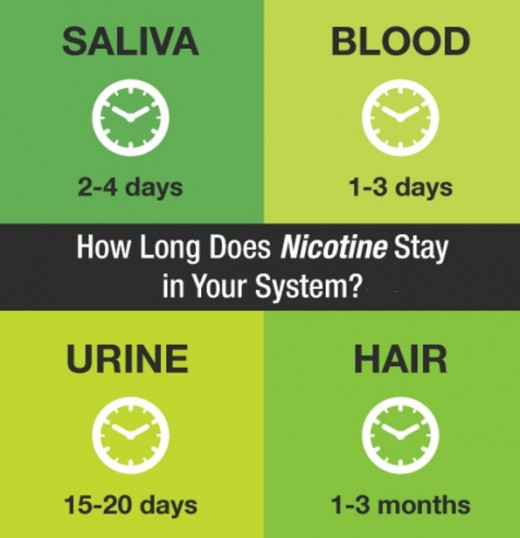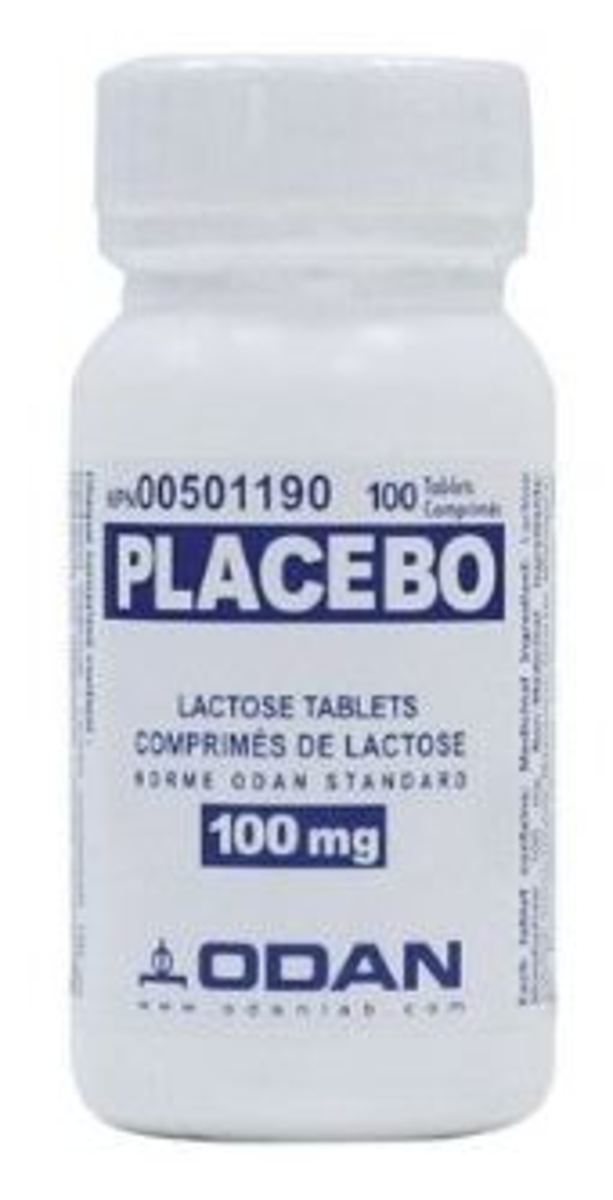How Long Does Nicotine Stay In Your System? (Blood, Urine and Saliva)
Nicotine and its Effects to your Health
Nicotine is a chemical that has nitrogen. It is an alkaloid commonly found in tobacco plant. It can also be synthetically produced. If you smoke tobacco, the nicotine is absorbed through the wall lining of the lungs.
If you chew or sniff tobacco, it will be absorbed through the mucous membranes of the mouth and nose. The skin can also absorb nicotine. Once nicotine enters the bloodstream, it will travel to the brain and crosses the blood-brain barrier. Once it gets in the brain, it will activate the cholinergic receptors.

Effects of Nicotine on the Body
Products containing nicotine are hazardous to the body. Nicotine adversely affect the different systems in the human body. It can weaken the immune system. It affects the ability of the body to dispose damaged cells, which could eventually lead to formation of cancer cells.
- Nicotine affects brain activity. It disrupts the neurotransmitter activity of the brain. You will feel light-headed, dizzy, tremors, and sleep disturbances.
- Nicotine can significantly increase the heart rate. It is one of the causes of hypertension and increases the risk of heart-related diseases.
- Too much nicotine in the body could affect your ability to see at night. It can also affect your peripheral vision and speeds up degenerative changes of the eyes.
- Nicotine speeds up the calorie-burning process. However, it decreases the body’s endurance to weight loss.
- Nicotine can significantly affect the circulation of blood. Too much nicotine in the blood could lead to erectile dysfunction, increases the right of miscarriage and infertility. Babies with mothers addicted to nicotine are prone to low birth weight, increases the risk of lung problems, and born prematurely.
- Too much nicotine in the body can alter the structures of the cells, which increases your risk for fractures. In the long run, your bone will weaken, which could lead to osteoporosis.
- Nicotine can adversely affect the lung functions. Over time, it will increase your risk for pneumonia, emphysema, bronchitis, other types of lung-related diseases, and even cancer.
Nicotine Addiction
Nicotine can be very addictive. If you are used to consuming nicotine and stops it abruptly, you will experience withdrawal symptoms such a nicotine craving, easy irritability, anxiety, depression, feeling weak, lack of concentration, and depression.
Nicotine addiction is extremely difficult to stop. A lot of people are having a hard time quitting.
How long does nicotine stay in your system?
- Nicotine in the blood - If you smoke a cigarette, 1 mg of nicotine enters the bloodstream. It will stay there within 1 to 3 days after your last nicotine use.
- Nicotine in urine - Nicotine can be detected in the urine within three to four days after the last time you introduce nicotine in the body. Passive smokers/occasional smokers, nicotine still be present in the urine within 15 to 20 days.
- Nicotine in the saliva - Traces of nicotine can stay in the saliva for up to four days.
- Nicotine in the hair - Traces of nicotine can stay in your hair for months. A hair test can actually detect the presence of nicotine.

Factors that decide how long nicotine stays in the body
- Frequency of use – Frequent tobacco users have more nicotine in the body. Light users are those people who smoke once a week. Medium users smoke two to three times a week while heavy users consume nicotine on a continuous level
- Individual variation – How soon the body eliminate nicotine depends on factors like age, hormones, diet, and genes. The type of diet you have can greatly affect your body’s ability to remove nicotine. After meal, hepatic blood flow rises by up to 30%, which helps eliminate nicotine by up to 40%.Menthol can inhibit the metabolism of nicotine in the liver. Nicotine can be thoroughly eliminated in younger people than in older nicotine users. Genetics have a huge role to play in metabolizing nicotine. Caucasians or Hispanics metabolize nicotine more than Americans, Asians, and Africans.
- Time of the day – during daytime, the ability of the body to eliminate nicotine can decrease by up to 17%. The slowest nicotine clearance takes place if you are asleep because hepatic blood flow declines significantly.
- Medications – The metabolism of nicotine can be inhibited by other pharmaceutical products.
Nicotine Drug Test
How to detect the level of nicotine in your body? Well, there are various types of nicotine drug test. These include the following:
- Blood Test – This is one of the most accurate ways to detect nicotine in the body. It is widely used all over the world. A blood sample is required and will be sent to the laboratory to detect the presence of nicotine in the body.
- Urine Test – This is one of the commonly used nicotine test primarily because it is easy to do and will not need that much money. A urine sample will be collected and a nicotine strip is dipped in the urine for about five minutes. Positive result confirms the presence of nicotine in the urine.
- Saliva Test – It is somewhat similar to the urine nicotine test. A saliva sample is needed and a test strip will be soaked in the saliva for about 20 minutes.
- Hair Test – This test is actually the last resort. If the aforementioned tests are unsatisfactory, then a hair test will be conducted. As mentioned above, the hair takes a long time to metabolize nicotine. Therefore, hair test is one of the most reliable tests to detect the presence of nicotine. A hair sample is needed. If the person is bald, then hair from other parts of the body will be used.
For more info on : How long does nicotine stay in your system
Ways to get rid of nicotine from the body
If a nicotine test is upcoming and you want to make sure that the test will turn out negative, then here are a few ways you can use to speed up the nicotine elimination process.
- Drink plenty of water – Make it a habit to drink plenty of water every day, especially if you are a heavy smoker. The kidney can help flush out nicotine from the body along with other toxins.
- Increase your intake of antioxidant-rich foods – The types of foods you eat can significantly affect the ability of the body to get rid of nicotine. Intake of antioxidant-rich foods can speed up the nicotine elimination process. Natural fruit juices are rich in antioxidants, but make sure you don’t put sugar in it to maximize its antioxidant property. It would also help if you are going to consume foods that increase the production of bile. You probably do not know, bile plays a very important role in the detoxification process. It thoroughly removes nicotine in the body. Examples of bile-producing foods include garlic and onion.
- Exercise vigorously – If you want to speed up the metabolism, then you have to do exercise vigorously. However, you should avoid over exercising as it might take its toll to your health. Simple deep breathing exercise can help get rid of nicotine from the body and reduces nicotine craving.
- Increase your intake of vitamin C – Vitamin C creates white blood cells, the fighting cells of the body. It also increases the body’s metabolism. Citrus fruits are rich in vitamin C. Carrot and cucumber juices also help flush out nicotine and supply the body with essential vitamins like A, B, and E.
Nicotine is highly addictive. It is a substance that should be taken in moderation. Once it gets out of control, it can take a toll to your health. Before taking any products containing nicotine, you have to find out whether it is good for your health and overall well-being.








